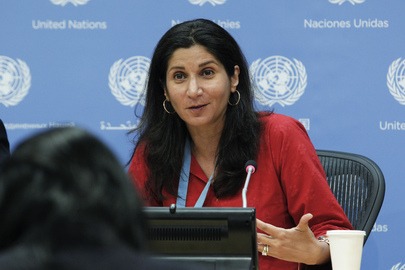Use of Private Military and Security Companies by the United Nations
As WILPF's March 2013 Call for Accountability of Private Military and Security Companies (PMSCs) highlighted, the increasing use of PMSCs raise critical challenges to women's human rights and the women peace and security agenda, including through a lack of accountability for perpetuation of gender based violence. On 31 July 2013 the UN Working Group on the Use of Mercenaries addressed some of these human rights issues - though with very little gender or women's human rights attention - in a panel on the “Use of Private Military and Security Companies (PMSCs) by the United Nations.” The panel aimed to foster public awareness of the nature and extent of the UN's use of PMSC, PSCs and to discuss the UN policies and practices with a view to identifying strategies to address any gaps and challenges. Panelists included Stuart Groves (Office of the UN High Commissioner for Human Rights), Rick Cottam (UN Staff Union, International Criminal Tribunal for the former Yugoslavia), Lou Pingeot (Global Policy Forum), Mirko Sossai (University of Rome), Ase Gilje Ostensen (University of Bergen), and Sabelo Gumedze (Private Security Industry Regulatory Authority).
The event created the opportunity to address key challenges to human rights that the UN's increasing use of private military and security companies (PMSCs or PSCs) raises.  It highlighted challenges and gaps of oversight and accountability focusing on the Department of Security and Safety (DSS) guidelines. Challenges include operationalization of the guidelines in a functional database, self-reporting by companies, screening of individuals rather than PMSC board members or companies for human rights records, and inadequate tracking of PMSCs through frequent name changes.
It highlighted challenges and gaps of oversight and accountability focusing on the Department of Security and Safety (DSS) guidelines. Challenges include operationalization of the guidelines in a functional database, self-reporting by companies, screening of individuals rather than PMSC board members or companies for human rights records, and inadequate tracking of PMSCs through frequent name changes.
However, while this panel addressed issues of human rights, it was, as a whole, gender-blind. It did not address key challenges from a gender perspective such as limited gender mainstreaming by PMSCs into peace support operations and post-conflict reconstruction, gender based violence and other human rights violations by operators, or masculinized cultures of impunity with limited women's participation. As discussions of strengthening PMSC accountability progress, it will be critical to integrate issues of women, peace and security into these conversations and action to promote peace, security, and human rights for all.
